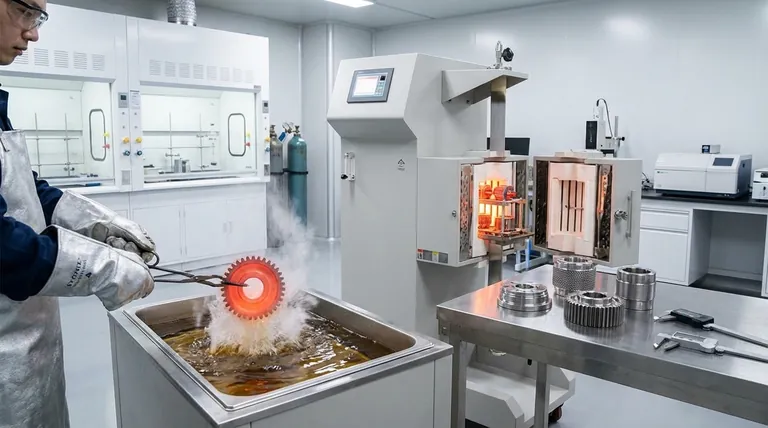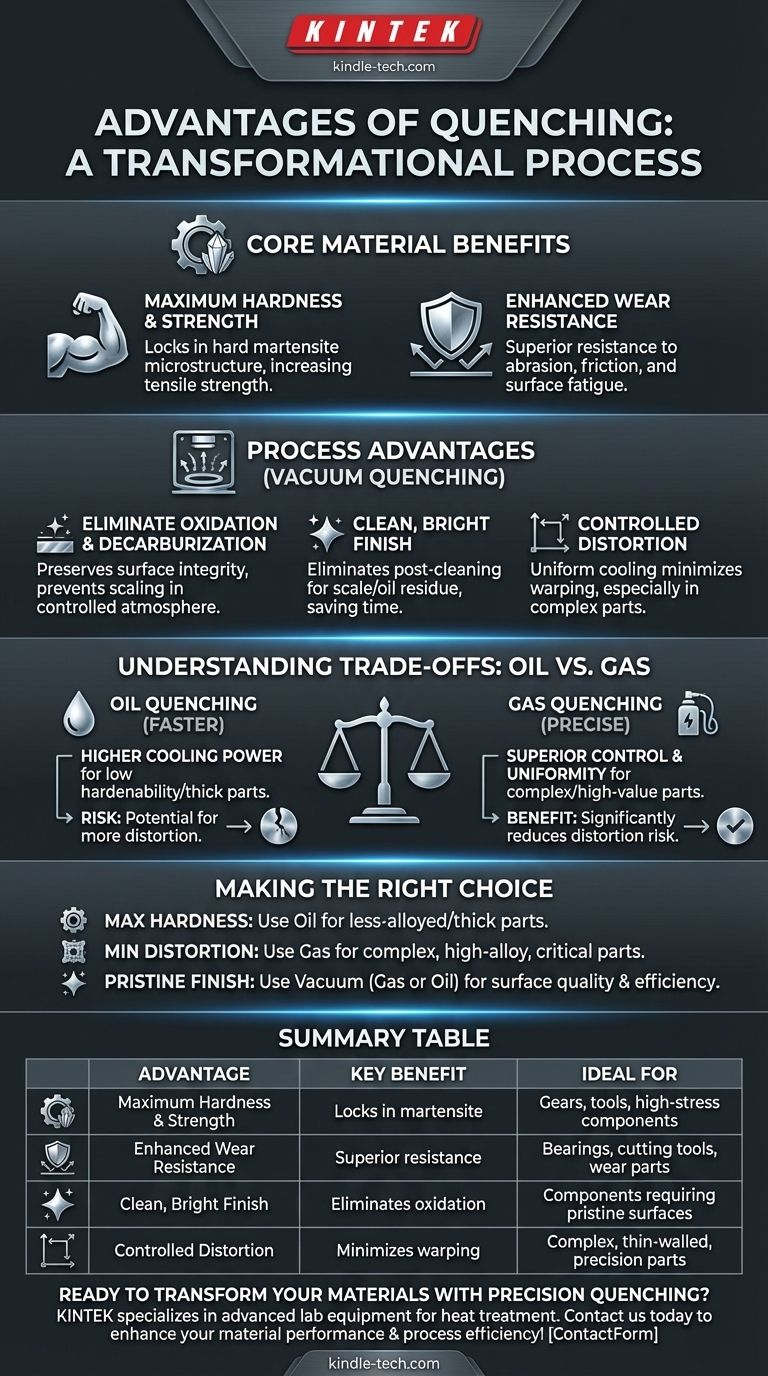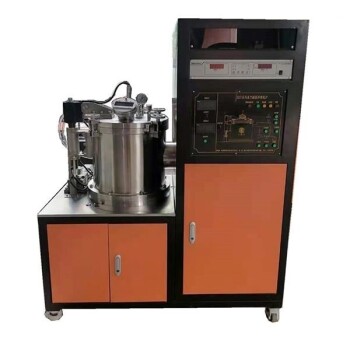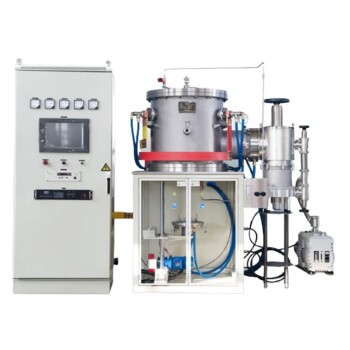At its core, quenching is a transformative process used to achieve specific, enhanced material properties that are otherwise unattainable. Its primary advantage is the ability to rapidly cool a metal from a high temperature, locking in a very hard and strong microstructure, which dramatically improves the performance and durability of the final component.
Quenching is not merely a hardening technique; it is a method of precise metallurgical control. The key is understanding that different quenching methods, such as oil versus gas, offer a distinct trade-off between cooling speed, surface quality, and the potential for part distortion.

Why Quench? The Core Material Benefits
The fundamental goal of quenching is to manipulate a metal's internal crystal structure. This controlled transformation delivers significant improvements in mechanical properties.
Achieving Maximum Hardness and Strength
Quenching's most recognized benefit is the dramatic increase in hardness and tensile strength. By cooling rapidly, the metal's atomic structure is "frozen" into a hard, brittle phase known as martensite, preventing it from forming a softer, more ductile structure.
Enhancing Wear Resistance
A direct result of increased surface hardness is superior wear resistance. Harder surfaces are more resistant to abrasion, friction, and surface fatigue, which is critical for components like gears, bearings, and cutting tools.
Process Advantages: Beyond Hardness
Modern quenching techniques, particularly those performed in a vacuum, offer significant process-level advantages that impact efficiency and final part quality.
Eliminating Surface Oxidation and Decarburization
When performed in a controlled atmosphere like a vacuum or with inert gas, quenching prevents oxidation (scaling) and decarburization (the loss of carbon from the steel's surface). This is crucial because it preserves the integrity and hardness of the component's surface layers.
Ensuring a Clean, Bright Finish
Vacuum quenching, whether with oil or gas, produces parts with a clean and bright surface finish. This eliminates the need for secondary cleaning operations to remove scale or oil residue, saving both time and cost.
Gaining Control Over Part Distortion
While all rapid cooling introduces stress that can cause distortion, modern methods offer greater control. High-pressure gas quenching, for instance, provides a more uniform and less severe cool than traditional oil, minimizing the distortion of complex or thin-walled parts.
Understanding the Trade-offs: Oil vs. Gas Quenching
The choice of quenching medium is one of the most critical decisions in heat treatment. It involves a clear trade-off between cooling power and process control.
The Need for Speed: Oil Quenching
Oil quenching provides a faster cooling rate than gas quenching. This higher cooling power is essential for hardening materials with lower hardenability or for treating parts with very thick cross-sections, ensuring they achieve the required hardness throughout.
The Pursuit of Precision: Gas Quenching
Gas quenching offers superior control and uniformity. While slower, the cooling rate can be precisely managed by adjusting gas pressure and flow. This less severe process significantly reduces the risk of distortion and cracking, making it ideal for high-value, dimensionally sensitive components.
Environmental and Safety Considerations
Modern contained quenching systems, both oil and gas, offer major advantages in safety and environmental protection. They eliminate the fire hazards and noxious fumes associated with older, open-tank methods, creating a cleaner and safer working environment.
Making the Right Choice for Your Application
Selecting the optimal quenching method requires balancing the material requirements against the geometric complexity of the part.
- If your primary focus is achieving maximum hardness on less-alloyed steels or thick parts: Oil quenching is often necessary due to its faster cooling rate.
- If your primary focus is minimizing distortion on complex, high-alloy, or dimensionally critical parts: Gas quenching provides a more controlled and uniform cool, protecting the component's geometry.
- If your primary focus is pristine surface quality and process efficiency: Vacuum quenching (either gas or oil) is the superior choice, as it prevents surface defects and eliminates post-treatment cleaning.
By understanding these principles, you can select the precise quenching method to transform a standard material into a high-performance component.
Summary Table:
| Advantage | Key Benefit | Ideal For |
|---|---|---|
| Maximum Hardness & Strength | Locks in a hard martensite microstructure | Gears, tools, high-stress components |
| Enhanced Wear Resistance | Superior resistance to abrasion and friction | Bearings, cutting tools, wear parts |
| Clean, Bright Finish | Eliminates oxidation and decarburization | Components requiring pristine surfaces |
| Controlled Distortion | Minimizes part warping and cracking | Complex, thin-walled, precision parts |
Ready to transform your materials with precision quenching?
KINTEK specializes in advanced lab equipment and consumables for heat treatment processes. Whether you need the rapid cooling of oil quenching or the precise control of gas quenching, our solutions are designed to help you achieve superior hardness, minimize distortion, and ensure a flawless finish.
Let our experts help you select the right quenching method for your laboratory's specific needs. Contact us today to discuss how we can enhance your material performance and process efficiency!
Visual Guide

Related Products
- Vertical Laboratory Tube Furnace
- Vacuum Heat Treat Furnace and Levitation Induction Melting Furnace
- Laboratory Muffle Oven Furnace Bottom Lifting Muffle Furnace
- 1700℃ Muffle Oven Furnace for Laboratory
- 1800℃ Muffle Oven Furnace for Laboratory
People Also Ask
- How to design a pyrolysis reactor? Optimize for Biochar, Bio-oil, or Syngas Yield
- What is the purpose of vacuum heat treatment? Achieve Superior Metallurgical Purity and Performance
- What is the difference between calcination and sintering furnace? A Guide to Thermal Processing Goals
- What are the advanced heat treatment techniques? Achieve Precision, Durability, and Superior Performance
- What critical role does a halogen infrared heating furnace play in converting TiO2 to TiN? Optimize Your RTN Process
- What are the steps of the hardening process? Master the 3-Step Heat Treatment for Superior Metal Strength
- What is the method of sintering? A Guide to Building Strong, Dense Components from Powder
- What is the minimum detectable leak rate? Find the Right Method for Your Application



















